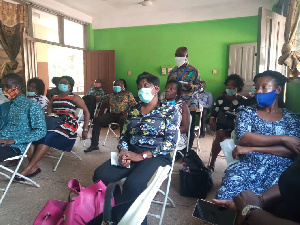- Home - News
- Polls
- Year In Review
- News Archive
- Crime & Punishment
- Politics
- Regional
- Editorial
- Health
- Ghanaians Abroad
- Tabloid
- Africa
- Religion
- Election 2020
- Coronavirus
- Photo Archives
- News Headlines
- Press Release
General News of Saturday, 7 November 2020
Source: GNA
Information Officers urged to provide effective data for national development
The Metropolitan, Municipal and District Information Officers (MMDAIOs) have been asked to provide the government with effective data to assist in decision-making.
The Acting Greater Accra Regional Information Officer, Ms Shalomina Awuku Bekoe, made the call at the end of a day’s training programme for 29 information officers in Accra.
Organised by the Greater Accra Information Services Department, the training aimed to equip and resource the participants to collect and analyse data for use by relevant state authorities.
Ms Bekoe said without access to data, which constituted the basis for the implementation of certain policy decisions, the government would be unable to plan for human and national development.
She cautioned Information officers about the production of wrong data, saying it could adversely impact on expected outcomes.
She urged the officers to have comprehensive and balanced data for effective results.
“In undertaking samplings, never force a respondent to give you information against his or her will,” she said and charged the participants to desist from sedentary data collection and to go to the field for accurate information.
The Information Officer urged the officers to avoid cooking figures that could have disastrous repercussions.
She asked the MMDAIOs to refrain from engaging in partisan politics in order not to compromise the validity of their work.
Ms Rebecca Osei-Mensah, a facilitator of the programme, said targeting a population and knowing the cultural values of the communities before entry was very important in data collection.
She urged MMDIOs to desist from falsification of data which could have far-reaching consequences.
They should make use of focal persons such as assemblymen and women and opinion leaders to lead them to acquire accurate information from targeted sources.
“Do not force respondents to give you information against their will,” she said, and that for the sake of language barrier, respondents should be made to choose their translators to interpret the information for them.
At the end of the exercise, participants were given customized mobile phones to undertake the data collection exercise.
Entertainment










